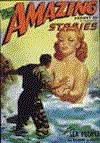|
|
|
Harry Potter is not just for children September 2, 1999 By Franklin Harris If you haven't heard of Harry Potter by now, you're either not a parent, your children have yet to advance beyond picture books or your children are dangerously illiterate. (If the last, send them to the library now. No excuses.) Harry is the English-speaking world's latest literary sensation. "Harry Potter and the Prisoner of Azkaban," the third novel to chronicle his exploits, has dethroned "Hannibal" as the reigning monarch of England's bestseller lists. And while it has yet to be published on this side of the Atlantic, pre-orders have nevertheless deposited it atop Amazon.com's 100 Hot Books list. Meanwhile, the first two installments in the Harry Potter series, "Harry Potter and the Sorcerer's Stone" and "Harry Potter and the Chamber of Secrets," rest comfortably in the top five of this week's New York Times bestseller list. All this isn't bad (to say the least) for an author who was an unemployed single mother when she penned "Harry Potter and the Sorcerer's Stone." J.K. Rowling was living on public assistance (a quaint, non-judgmental term for welfare) with her infant daughter in a tiny Edinburgh flat when she decided she must achieve something or go "stark raving mad," as her publicity literature tells the tale. The first Harry Potter book went on to win the British Book Awards Children's Book of the Year honor and praise from critics in both England and the United States. Still, it's only now, with the impending stateside release of the third Harry Potter book, that Potter Mania has set in. The Potter books are even the subject of overly analytical, pointy-headed debate in the online magazine Slate (www.slate.com). To boil them down to their essentials, the Harry Potter novels tell the story of a young boy (Harry) who just happens to be the orphan son of a witch and a wizard. Like all budding wizards in the world Rowling has created, he goes to a special school where he learns to use his magical abilities. In short, the Potter novels are part of the long and proud tradition of children's fantasy literature that includes the Oz books, C.S. Lewis' "Chronicles of Narnia" and the works of Roald Dahl. They are a welcome respite from the trend that has seen children's fantasy stagnate into a pond of R.L. Stine-level hackwork. As they deal with magic, Jerry Falwell will probably not like Rowling's books, but that is his loss, as usual. Generations of children have read similar stories with no ill effects, and the Rev. Fallwell and company can get over it. That Rowling's novels are so traditional may partly explain why they've become so staggeringly popular, even among adults. My pet theory -- difficult to prove -- is parents are simply steering their children toward books similar to what they themselves read when they were young. Of course, it may just be excellent marketing. Not that adults reading "children's literature" is a bad thing, anyway. If a talented writer like Ms. Rowling can face down mere typists like John Grisham on the bestseller lists, then three cheers for her. In fact, sometimes it's hard to tell what is children's literature and what isn't. Science fiction author Robert Heinlein used to say that the only difference between his adult novels and his "juveniles" was that the juveniles didn't have any sex in them. And I was out of college when I purchased an omnibus collection containing Dahl's two most famous works, "Charlie and the Chocolate Factory" and "Charlie and the Great Glass Elevator," but then I'm odd that way. Whatever the reason, Harry Potter is a welcome literary success, especially in an age when most bestsellers are made on the whim of Oprah Winfrey. |

RECENT COLUMNS
Order a helping of Cartoon Network's 'Robot Chicken'
03/31/05
Campaign against video games is political grandstanding
03/24/05
Prize-winning author is 'Wrong About Japan'
03/17/05
Censored book not a good start
03/10/05
Some superhero comics are for 'fanboys' only
03/03/05
'Constantine' does well with its out-of-place hero
02/24/05
'80s publisher First Comics' legacy still felt
02/17/05
Director's cut gives new 'Daredevil' DVD an edge
02/10/05
Put the fun back into 'funnybooks'
02/04/05
Is 'Elektra' the end of the road for Marvel movies?
01/27/05
'House of Flying Daggers' combines martial arts and heart
01/20/05
Anniversary edition of 'Flying Guillotine' has the chops
01/13/05
Movie books still have role in the Internet era
01/06/05
Looking ahead to the good and the bad for 2005
12/30/04
The best and worst of 2004
12/23/04
'Has-been' Shatner is a 'transformed man'
12/16/04
© Copyright 2005 PULP CULTURE PRODUCTIONS
Web site designed by Franklin Harris.
Send feedback to franklin@pulpculture.net.